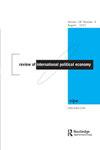在扩散理论中增加“起源”:中国和欧盟在绿色金融中的作用对比
IF 3.7
1区 经济学
Q1 ECONOMICS
引用次数: 1
摘要
摘要自由主义经济思想的传播受到了三个全球转变的挑战:两极倾斜、民族主义和气候变化。一个后果是,政策规范源自新的地方,并带有新的内容。迄今为止,国际政治经济学(IPE)中的扩散理论解释了自由主义政策规范是如何通过“适应”当地环境而传播的,但较少解释它们为什么从特定来源扩散。三个全球性的转变使得对起源的关注变得至关重要。我建议将比较政治经济学(CPE)纳入扩散理论,以捕捉形成政策规范“起源”的力量和条件。通过分析绿色金融政策在全球的扩散,我展示了中国封闭的资本账户和国家控制的金融体系,以及国家主导和易于试验的治理体系,是如何形成自上而下的市场导向方法的,使中国成为政策工具的先驱。其次,我展示了欧盟的全球经济地位、独立的中央银行以及经过谈判和协商的治理体系如何创造了一种自下而上的市场促进方法,使欧盟成为政策内容的标准制定者。增加起源为扩散理论开辟了一条前进的道路,探索了某些政治经济特征如何在扩散过程中发挥作用,以及这如何影响今天强调的扩散机制和适应过程。本文章由计算机程序翻译,如有差异,请以英文原文为准。
Adding ‘origination’ to diffusion theory: contrasting the roles of China and the EU in green finance
Abstract The diffusion of liberal economic ideas has been challenged by three global shifts: a bipolar tilt, nationalism, and climate change. One consequence is that policy norms are originating from new places and carry new content. To date, diffusion theory in International Political Economy (IPE) explains how liberal policy norms spread through ‘adaptation’ to local circumstances, but less why they diffuse from particular origins. The three global shifts make a focus on origins critical. I propose integrating Comparative Political Economy (CPE) into diffusion theory to capture the forces and conditions shaping policy norm ‘origination’. Analyzing the global proliferation of green finance policies, I show how China’s closed capital account and state-controlled financial system combined with a state-led and experimentation-prone governance system creates a top-down market-steering approach that makes China a pioneer of policy instruments. Second, I show how the EU’s global economic position, its independent central bank, and a negotiated and consultative governance system create a bottom-up market-facilitating approach that makes the EU a standard-setter of policy content. Adding origination creates a path forward for diffusion theory, exploring how certain political economy traits create roles in the diffusion process and how this impacts the diffusion mechanisms and adaptation processes emphasized today.
求助全文
通过发布文献求助,成功后即可免费获取论文全文。
去求助
来源期刊
CiteScore
9.20
自引率
9.30%
发文量
47
期刊介绍:
The Review of Political Economy is a peer-reviewed journal welcoming constructive and critical contributions in all areas of political economy, including the Austrian, Behavioral Economics, Feminist Economics, Institutionalist, Marxian, Post Keynesian, and Sraffian traditions. The Review publishes both theoretical and empirical research, and is also open to submissions in methodology, economic history and the history of economic thought that cast light on issues of contemporary relevance in political economy. Comments on articles published in the Review are encouraged.

 求助内容:
求助内容: 应助结果提醒方式:
应助结果提醒方式:


